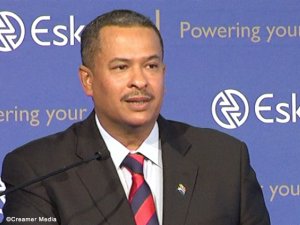Power utility undertakes delayed maintenance this winter, public assistance crucial

Eskom CEO Brian Dames highlights how residential customers can ease the strain on the country's power stystem this winter. Camera: Nicholas Boyd. Editing: Darlene Creamer. Recorded: 22/04/13.
This winter, South Africans are urged, more than ever, to reduce their electricity use, as State-owned power utility Eskom undertakes long-duration planned maintenance, which began last month and will continue through August, to ensure the long-term sustainability of its power plants.
Speaking at the quarterly State of the System briefing in Johannesburg, last month, Eskom CEO Brian Dames said the utility could not defer planned generation maintenance and would maintain nine of its generation units during this time.
Maintenance is usually reduced during winter to meet the higher demand. However, planned maintenance was prevented as a result of reduced imports from Cahora Bassa, owing to the failure of a transmission line from Mozambique, the unplanned outage of Koeberg Unit 1 and the need to manage the impact of the strikes at coal miner Exxaro’s mines, all of which resulted in a tight power system.
The utility forecasts a winter peak of 36 800 MW against installed capacity of about 43 000 MW this year.
Dames said, while there was sufficient capacity to meet the demand during the day, the peak demand period, during 17:00 and 21:00, was a concern, adding that if it could be reduced by 2 000 MW, there would be a secure electricity supply.
With residential users switching on lights, heaters and cookers, the evening winter demand can reach up to 3 000 MW an hour; however, the four-million residential customers using geysers, pool pumps and space heating can save 2 000 MW by switching off the equipment for four hours.
“Eskom has kept the lights on during this summer, as we have done over the past five years, but going into winter, we face new challenges that cannot be overcome alone. Our power stations are ageing and are run hard; sustained high levels of planned maintenance are needed to ensure reliable performance,” he explained.
Further, he said there was concern about the impact of the lower-than-hoped-for 8% yearly increases, approved in February by the National Energy Regulator of South Africa, on Eskom’s ability to finance demand-side measures that are needed to manage a strained power system.
He appealed to South Africa to help Eskom beat the winter peak and switch off all nonessential appliances during 17:00 and 21:00.
Electricity consumers were also urged to find alternatives to using electric heaters, such as dressing warmly, insulating ceilings to keep the heat in rooms, investing in thermostatically controlled heaters and considering the use of gas heaters and hot-water bottles.
Meanwhile, to maintain its current fleet, comply with environmental requirements and ensure consistent performance from its current assets, Eskom will imple- ment a five-year generation maintenance strategy.
It will ensure an average energy-avail- ability factor of 80%, planned maintenance of 10% and unplanned outages of 10%.
Dames said most of the maintenance would be completed, resulting in planning certainty, and outages would be under- taken to ensure Eskom complied with environmental legislation.
“We will not put the country at risk of a blackout, but should the system come under severe strain, we will take any measure possible, such as rotational load-shedding, to avoid a blackout. We do have confidential contingency measures in place, should that happen, but we will take action to ensure we do not get to that point,” he assured.
Industry and Residential Programmes Successful
Eskom’s power buyback programme, which started in November last year and will conclude on May 31, resulted in up to 1 000 MW of power being bought back from large customers, mainly in the ferrochrome and ferroalloy industries.
During summer, Eskom’s power-alert television messages, broadcast across the country, consistently achieved a residential evening peak demand reduction of more than 320 MW.
Phase 1 of the residential mass roll-out programme is complete and achieved total savings of 218 MW. It also created 227 direct jobs and 3 018 indirect jobs.
Phase 2 was launched in September last year and targets a saving of 80 MW, which Eskom expects to achieve in 2014. The programme aims to approach between 150 000 and 180 000 middle- income households that will benefit from the retrofit of geyser and pool timers, efficient shower heads and lighting. More than 800 indirect jobs are expected to be created.
Meanwhile, Eskom’s heat pump rebate programme has, to date, resulted in 6 807 installed units.
Dames also urged South Africans to switch to energy efficient technologies and to take advantage of Eskom’s rebate programmes, which provide various free products that comply with energy efficiency requirements.
“We are determined to keep the lights on for South Africa and not to lead the country into contingencies, but Eskom cannot do it alone,” he concluded.
Comments
Announcements
What's On
Subscribe to improve your user experience...
Option 1 (equivalent of R125 a month):
Receive a weekly copy of Creamer Media's Engineering News & Mining Weekly magazine
(print copy for those in South Africa and e-magazine for those outside of South Africa)
Receive daily email newsletters
Access to full search results
Access archive of magazine back copies
Access to Projects in Progress
Access to ONE Research Report of your choice in PDF format
Option 2 (equivalent of R375 a month):
All benefits from Option 1
PLUS
Access to Creamer Media's Research Channel Africa for ALL Research Reports, in PDF format, on various industrial and mining sectors
including Electricity; Water; Energy Transition; Hydrogen; Roads, Rail and Ports; Coal; Gold; Platinum; Battery Metals; etc.
Already a subscriber?
Forgotten your password?
Receive weekly copy of Creamer Media's Engineering News & Mining Weekly magazine (print copy for those in South Africa and e-magazine for those outside of South Africa)
➕
Recieve daily email newsletters
➕
Access to full search results
➕
Access archive of magazine back copies
➕
Access to Projects in Progress
➕
Access to ONE Research Report of your choice in PDF format
RESEARCH CHANNEL AFRICA
R4500 (equivalent of R375 a month)
SUBSCRIBEAll benefits from Option 1
➕
Access to Creamer Media's Research Channel Africa for ALL Research Reports on various industrial and mining sectors, in PDF format, including on:
Electricity
➕
Water
➕
Energy Transition
➕
Hydrogen
➕
Roads, Rail and Ports
➕
Coal
➕
Gold
➕
Platinum
➕
Battery Metals
➕
etc.
Receive all benefits from Option 1 or Option 2 delivered to numerous people at your company
➕
Multiple User names and Passwords for simultaneous log-ins
➕
Intranet integration access to all in your organisation



















